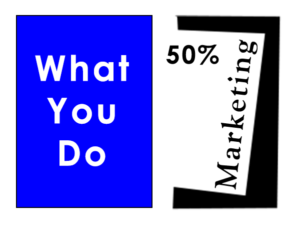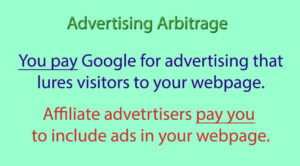
Is marketing a webbook easier than marketing an ebook (or a digital book in another format)? It seems that the answer is probably no. Nonetheless, marketing a webbook may be simpler.
Landing Page
If you market an ebook effectively and persuade a potential customer to buy it, you still have to get that customer to come to your website store to make the purchase. Then you have to deliver the book somehow.
Another way to complete a purchase is to send the buyer to one of the online bookstores (catalogs, directories) such as Amazon, iTunes, or Google Play. These bookstores automate the buyer’s purchase and delivery. They load your ebook into the buyer’s private collection so that the buyer may access the ebook with their smart phone, tablet, or even desktop computer. Although everything is done automatically, it’s out of your control. And it’s one step beyond your sales pitch.
For a webbook, however, you simply market the book as well as you can. You direct people to the webbook. When they get to the book website, they are at the webbook itself; there’s nothing for users to install. With a webbook, the book cover (the first webpage) itself becomes the landing page and potential buyers have immediate access to the make a purchase (buy a password). If it’s a free book, users simply use the Table of Contents and start reading. It’s a very simple procedure.
By selling your book directly, you bypass the bookstores that take a substantial share of your revenue.
What do you miss? Well, you miss being in the iTunes, Google Play, and Amazon online catalogs. There are a lot of people who will find an ebook just by searching through the catalogs. But just because you publish a webbook doesn’t mean that you can’t publish an ebook for inclusion in the various catalogs too. A similar ebook may be worth the effort to publish just as a marketing strategy to be included in the online bookstore catalogs even if the webbook is your primary publishing effort.
SEO
Read Chapter 14 to learn how your webbook provides you with marketing opportunities via SEO. This is a consideration you should not overlook.
As a general practice, you need to routinely and uniformly maximize all your webpages for SEO. This will help make your webbook become more visible (more likely to be ranked high by search engines). Beyond general practice, however, you can specifically maximize each webpage for SEO with techniques custom-tailored for each webpage.
SEO is a lot of work. Unfortunately, effective SEO requires your attention even if you hire someone to do it for you. It’s an inevitable and unavoidable task if you are to promote your webbook effectively.
Free Webbook
If you publish a free webbook supported by affiliate advertising, you can advertise your webbook effectively by a type of arbitrage. You pay for Google advertising to direct traffic to a specific webpage (chapter) in your webbook. You receive revenue from the affiliate advertising on your webpage. The revenue from the affiliate advertising must be more than the price of the advertising that you purchase from Google. You pocket the difference. This can be a very lucrative means of generating revenue, but it requires learning how to do it and then managing the process. In other words, it’s a special skill and requires busy work.

Advertising arbitrage is beyond the scope of this book, but there are books about it and plenty of online services and software tools to make it easier. There is also statistics-tracking software to make advertising arbitrage easier to manage. Advertising arbitrage is perhaps one of the biggest industries on the web, and you can make it work for your publishing efforts. Indeed, this is likely to be the future of book publishing.
Note that advertising arbitrage and SEO go hand and hand together. They make an effective base for a successful marketing program.
Social Media
The word on the street is that participation in social media will make authors and publishers wealthy. That may be an exaggeration. The trouble with social media is that it can easily take too much of your time. You have to balance the time it takes against its potential effectiveness to promote your webbook.
If you write a series of books for a small or modest-sized group of readers, becoming intimate with your clientele via social media can be rewarding both professionally and financially. It is worthwhile to spend time online associating with customers because you sell to them on an ongoing basis. On the other hand, if you write or publish a book for one group of customers today and yet another book for a different group of customers tomorrow, there’s probably not enough time in the day for you to use social media effectively for marketing.
This is simply to say, be realistic with a marketing technique that can swallow up your time. Yet for the right situation, social media can be very effective for you.
Also remember this about social media. Social media doesn’t necessarily create sales for you. The sale must still be made somewhere else. Social media creates leads. Thus, social media is just the first step in a multiple-step marketing process.
Sinclair’s Rule
No matter what you do as a self-employed person, you need to spend about half your time marketing if you want to be financially successful. If you’re a professional (e.g., attorney, accountant, architect), you spend time at Kiwanis meetings, take clients to lunch, play golf for business, do pro bono work, serve on committees, participate in organizations, and even get customers from your recreational activities.
Although the activities are different for every vocation, this marketing rule is a rough guideline for your time allocation. As an author or publisher, you are not exempt. Marketing just takes a lot of time, and without effective marketing there is little revenue.
Marketing is your responsibility. Sure you can hire someone to get the job done for you. But if you’re like me, you can’t afford the $75,000 annually it will take to farm it out to an employee.
This can be one of those aha moments for you. “Aha, that’s why I need to get a publisher. The publisher will do the marketing, and all I have to do is write.” Unfortunately, today publishers want to know how a writer will promote his or her book before the publisher will agree to publish it. And publishers are famous for putting all their promotional efforts (money) into their best sellers and little into their books that don’t show high initial sales. Consequently, the marketing always falls to the author, unless the book happens to have high initial sales. It’s a Catch 22.
Thus, your aha moment should be a little different. “Aha, I guess I’ll always have to do some marketing if I want to be a successful author or author-publisher.” But you’re not alone. Perhaps the author who spent more time marketing his writing than any other author in history was Mark Twain.
Online Marketing Techniques
There are many dozens of online marketing techniques. I’ve mentioned several above. You need to pick and choose which ones you will use. Here are some of the considerations:
Which fit my style, skills, personality, and interests?
For which am I technically competent?
Which are the most effective for my particular publishing products?
Which are the most cost-effective regarding both my time and resources?
Which best fit potential consumers?
How big is the market for a particular technique?
Etc.
There is no silver bullet (one size fits all). If you’re smart, the component marketing techniques for each of your publications will be a unique mix.
The Moral
The moral of this grim story is that you need to plan on spending a lot of your time marketing whether it’s SEO, advertising arbitrage, social media, or other means of digital promotion.